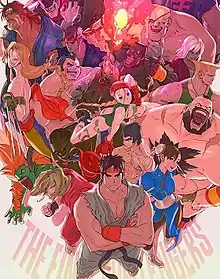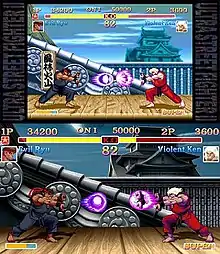Ultra Street Fighter II: The Final Challengers
Ultra Street Fighter II: The Final Challengers is a fighting game developed and published by Capcom for the Nintendo Switch video game console, which released worldwide on 26 May 2017 to celebrate the Street Fighter series' 30th anniversary. It is an updated version of 1994's Super Street Fighter II Turbo. The game features two graphical styles—classic pixel art and updated high-definition art. New gameplay mechanics and modes were also introduced, with minor changes being made to the game's balance. The game garnered mixed-to-positive reviews from critics, who praised its updated visuals, but criticized the $40 price, the Way of the Hado mode, and control problems.
| Ultra Street Fighter II: The Final Challengers | |
|---|---|
 Packaging artwork | |
| Developer(s) | Capcom |
| Publisher(s) | Capcom |
| Director(s) | Toshiyuki Yamamoto |
| Producer(s) | Yoshinori Ono |
| Artist(s) |
|
| Composer(s) |
|
| Series | Street Fighter |
| Engine | MT Framework |
| Platform(s) | Nintendo Switch |
| Release | 26 May 2017 |
| Genre(s) | Fighting |
| Mode(s) | Single-player, multiplayer |
Gameplay

Ultra Street Fighter II: The Final Challengers is an updated version of the 1991 fighting game Street Fighter II: The World Warrior.[1] Gameplay is based on the Super Street Fighter II Turbo iteration of Street Fighter II, however Ultra Street Fighter II introduces new mechanics like grapple breaks and re-tunes some aspects of the game's balance.[1] Combo timing has also been adjusted from the original games.[2]
The game is playable in two styles on both graphic and sound settings: the "Classic" graphic mode featuring pixel art graphics of the original game which is played in 4:3 aspect ratio, with the "New Generation" graphic mode featuring the updated high definition graphics of 2008's Super Street Fighter II Turbo HD Remix and is played in 16:9 widescreen.[3] In the classic sound style, the game uses the original arcade soundtrack and voice-acting, while in the updated new generation sound style uses includes newly remixed music and the characters' Japanese voices from the Street Fighter IV series.[4] The game supports all control options on the Nintendo Switch console, including play with a single Joy-Con controller.[2]
Ultra Street Fighter II has a standard roster of nineteen characters,[4] plus one hidden character. In addition to all seventeen fighters from Super Turbo, two characters–Evil Ryu and Violent Ken–have been added to the game's roster.[3][5] Evil Ryu first appeared in the series in 1996's Street Fighter Alpha 2.[2] He is a version of Street Fighter protagonist Ryu that has succumbed to the evil power Satsui no Hado.[3][2] Violent Ken makes his official debut in a Street Fighter game, having previously only appeared in the crossover fighting game SNK vs. Capcom: SVC Chaos.[2][6] He is a version of Ken Masters that has been brainwashed by M. Bison and makes use of Bison's Psycho Powers.[3][2] As Akuma becomes a regular selectable fighter, his Shin Akuma form, a secret boss from Street Fighter Alpha 2, is also featured as a secret character only selectable in local play through the input of a code on the character select screen.[7]
The game features local and online multiplayer.[8][6] Online multiplayer includes a point-based ranking system based on a player's wins and losses.[9] A "standby" feature has been added to the game's arcade mode, which allows other online players to challenge and take the place of the CPU opponent that the player typically battles in arcade.[9] A local cooperative game mode, known in the Alpha games as "Dramatic Battle", has been added in Ultra Street Fighter II now known as "Buddy Battle".[2][3][10] It allows players to team up in a two versus one fight against a CPU player.[2][3][10] Additionally the game includes a simplified one-hit knockout mode.[10]
In addition to the standard 2D gameplay, there is also an exclusive new Street Fighter V/Street Fighter IV-styled first-person battle mode known as "Way Of the Hado".[11] In this mode, the player controls Ryu in a first-person perspective to defeat as many Shadaloo Soldiers as possible (Sometimes, M. Bison also appears as a boss). For this mode, the player must hold the Joy-Con controller in both hands to perform attacks such as Hadouken, Shoryuken and Tatsumaki Senpukyaku in order to defeat enemies. As the player progresses throughout the game, the player can earn growth points to power up Ryu. The mode has three difficulties: Beginner, Standard and Extra. There is also a practice mode for practicing attacks, as well as an Endless mode that lets the player fight until Ryu's health bar is empty.
USFII includes a gallery mode, containing over 1400 illustrations from the art book SF20: The Art of Street Fighter. The player can also listen to each fighter's modern or classic-styled stage music while in gallery mode.
In the Color Edit mode, the player can make their own alternate palettes for each of the 19 fighters, then use them in Arcade Mode, VS Mode and Online Battles, allowing for the storage of up to 10 custom palettes for each character.
Development and release
Ultra Street Fighter II: The Final Challengers was developed by Japanese video game company Capcom.[1] The development team was composed of a mixture of old and young employees, some of whom worked on recent Capcom fighting games like Street Fighter V and Marvel vs. Capcom: Infinite.[1] On 14 February 2017, development of the game was 50% complete.[11]
The game was announced for the Nintendo Switch console in January 2017.[3][5] The announcement marked the beginning of Street Fighter's 30th anniversary celebration.[1] With the last Street Fighter title to release on a Nintendo system being 2011's Super Street Fighter IV: 3D Edition for the Nintendo 3DS, Capcom saw the launch of the Nintendo Switch as an opportunity to bring a brand-new remixed version of a classic Street Fighter game to a Nintendo console.[1] There are currently no plans to release the game on other consoles.[12]
On the decision to revisit Street Fighter II, series producer Yoshinori Ono noted that they wanted to go back to their roots.[1] Capcom chose to include two graphical styles so that the game would give old players a sense of nostalgia but still appeal to a younger audience with the updated art.[1] The game's high-definition graphics were created by Udon Entertainment.[3] The development team did not want to overhaul the game's balance as they want the game to feel like a fighting game from the 1990s.[1] However, they felt that some questionable aspects of the game's balance should be re-tuned.[1]
Ultra Street Fighter II: The Final Challengers was released on 26 May 2017.[13]
Reception
| Aggregator | Score |
|---|---|
| Metacritic | 66/100[14] |
| Publication | Score |
|---|---|
| Destructoid | 7/10[15] |
| Electronic Gaming Monthly | 65%[16] |
| Game Informer | 7/10[17] |
| GameRevolution | |
| IGN | 75%[19] |
| Nintendo Life | 6/10[20] |
| Polygon | 6/10[21] |
Ultra Street Fighter II: The Final Challengers received a mixed reception, according to review aggregator Metacritic.[14] Though the updated graphics were praised, the game was criticized for charging a US$40 retail release for what is essentially an updated port of the much cheaper Super Street Fighter II Turbo HD Remix.[20][21] The "Way of the Hado" mode was also criticized for poorly implemented motion controls that are prone to confusing attack inputs for other attacks, as well as being shallow in content.[15][17][18][20][21] The game's functionality of the Joy-Con controllers was also criticized[16] with critics pointing out issues with the Joy-Con's D-Pad and analog stick controls and suggested players pay an extra $70 to get a Pro Controller.[22] IGN concluded "Despite being the most complete version of Street Fighter II to date, the specific additions for the occasion just do not excite us."[19]
Sales
The game reached number 8 in the UK sales chart,[23] number 3 in Japan,[24] 2 in Australia and 3 in New Zealand[25] and number 3 in Switzerland.[26] In the USA eShop the game was number 2 behind Minecraft.[27] In August 2017, The Wall Street Journal's Takashi Mochizuki reported that the game sold over 450,000 copies, selling more than what Capcom expected. Because of this, Capcom has shown more interest in selling more games on the Switch.[28] As of 2018, the game has crossed 500,000 sales.[29]
References
- Otero, Jose (20 January 2017). "6 Things We Learned About Ultra Street Fighter II on Nintendo Switch". IGN. Retrieved 21 January 2017.
- Bowling, Steve (17 January 2017). "First Impressions: Round One With Ultra Street Fighter II On Nintendo Switch". Nintendo Life. Retrieved 21 January 2017.
- Hussain, Tamoor (12 January 2017). "Ultra Street Fighter 2 Announced for Switch, Has New Characters and Mode". GameSpot. Retrieved 13 January 2017.
- Ultra Street Fighter II: The Final Challengers – Nintendo Treehouse: Live with Nintendo Switch. YouTube. 20 January 2017. Retrieved 21 January 2017.
- Romano, Sal (24 January 2017). "Ultra Street Fighter II details network battles". Gematsu. Retrieved 13 January 2017.
- Ramos, Jeff (13 January 2017). "Fighting games on the Nintendo Switch will be a complicated affair". Polygon. Retrieved 13 January 2017.
- "How To Unlock Shin Akuma In Nintendo Switch's Street Fighter II". GameSpot. 21 July 2017. Retrieved 21 July 2017.
- Vazquez, Suriel (14 January 2017). "Capcom Talks Ultra Street Fighter II's New Characters, Gameplay On Nintendo Treehouse Stream". Game Informer. Retrieved 21 January 2017.
- Hussain, Tamoor (12 January 2017). "Ultra Street Fighter 2 Announced for Switch, Has New Characters and Mode". GameSpot. Retrieved 13 January 2017.
- McWhertor, Michael (13 January 2017). "Ultra Street Fighter 2 coming to Nintendo Switch". Polygon. Retrieved 13 January 2017.
- "Ultra Street Fighter II's FPS Mode Will Have You Shoryuken And Hadouken With Joy-Cons". Siliconera. 14 February 2017. Retrieved 14 February 2017.
- "'If this title sells extremely well we'll consider it... For the time being it's only going to be on [the] Switch' – Ono on USF2 console availability". 21 January 2017.
- Ramos, Jeff (1 March 2016). "Ultra Street Fighter 2: The Final Challengers hits Nintendo Switch in May". Polygon. Retrieved 11 March 2017.
- "Ultra Street Fighter II: The Final Challengers for Switch Reviews". Metacritic. Retrieved 27 May 2017.
- Carter, Chris (24 May 2017). "Review: Ultra Street Fighter II: The Final Challengers". Destructoid. Retrieved 27 May 2017.
- "Ultra Street Fighter II: The Final Challengers review". Egmnow.com. 30 May 2017. Retrieved 13 February 2019.
- Vazquez, Suriel. "Ultra Street Fighter II: The Final Challengers". Game Informer. Retrieved 27 May 2017.
- Vacheron, Griffin. "Ultra Street Fighter II: The Final Challengers Review". Game Revolution. Retrieved 27 May 2017.
- "Ultra Street Fighter II: The Final Challengers. Análisis para Nintendo Switch". IGN España. 24 May 2017. Retrieved 13 February 2019.
- McFerran, Damien (24 May 2017). "Review: Ultra Street Fighter II: The Final Challengers (Switch)". Nintendo Life. Retrieved 27 May 2017.
- Arthur Gies & Michael McWhertor (25 May 2017). "Ultra Street Fighter 2 review". Polygon. Retrieved 27 May 2017.
- Gies, Arthur (25 May 2017). "Ultra Street Fighter 2 review". Polygon.com. Retrieved 3 June 2017.
- "GFK Chart-Track". Chart-track.co.uk. Archived from the original on 4 June 2017. Retrieved 13 February 2019.
- "Japan's Video Game Rankings, May 22–28". Anime News Network. Retrieved 13 February 2019.
- Makuch, Eddie (31 May 2017). "Top 10 Best-Selling Games Of The Past Week In Australia And New Zealand For All Platforms". Retrieved 13 February 2019.
- "Games Charts - gamecharts.ch".
- "Switch eShop charts (5/31/17) – Nintendo Everything". Nintendoeverything.com. June 2017. Retrieved 13 February 2019.
- Vazquez, Suriel. "Report: Capcom Preparing More Switch Games After Ultra Street Fighter II Success". Game Informer. Retrieved 13 February 2019.
- Vogel, Mitch (9 May 2018). "Capcom Says Ultra Street Fighter II And Monster Hunter XX Enjoyed Hit Status". Nintendo Life. Gamer Network. Retrieved 29 March 2020.
External links
- Official website (in Japanese)